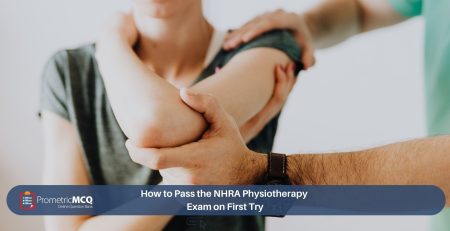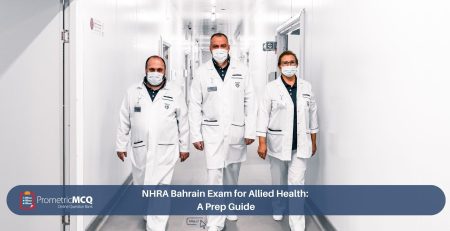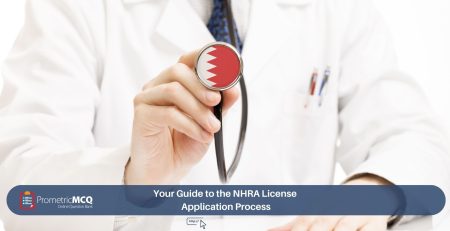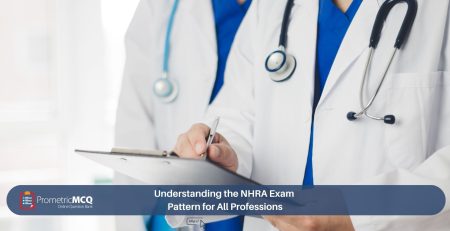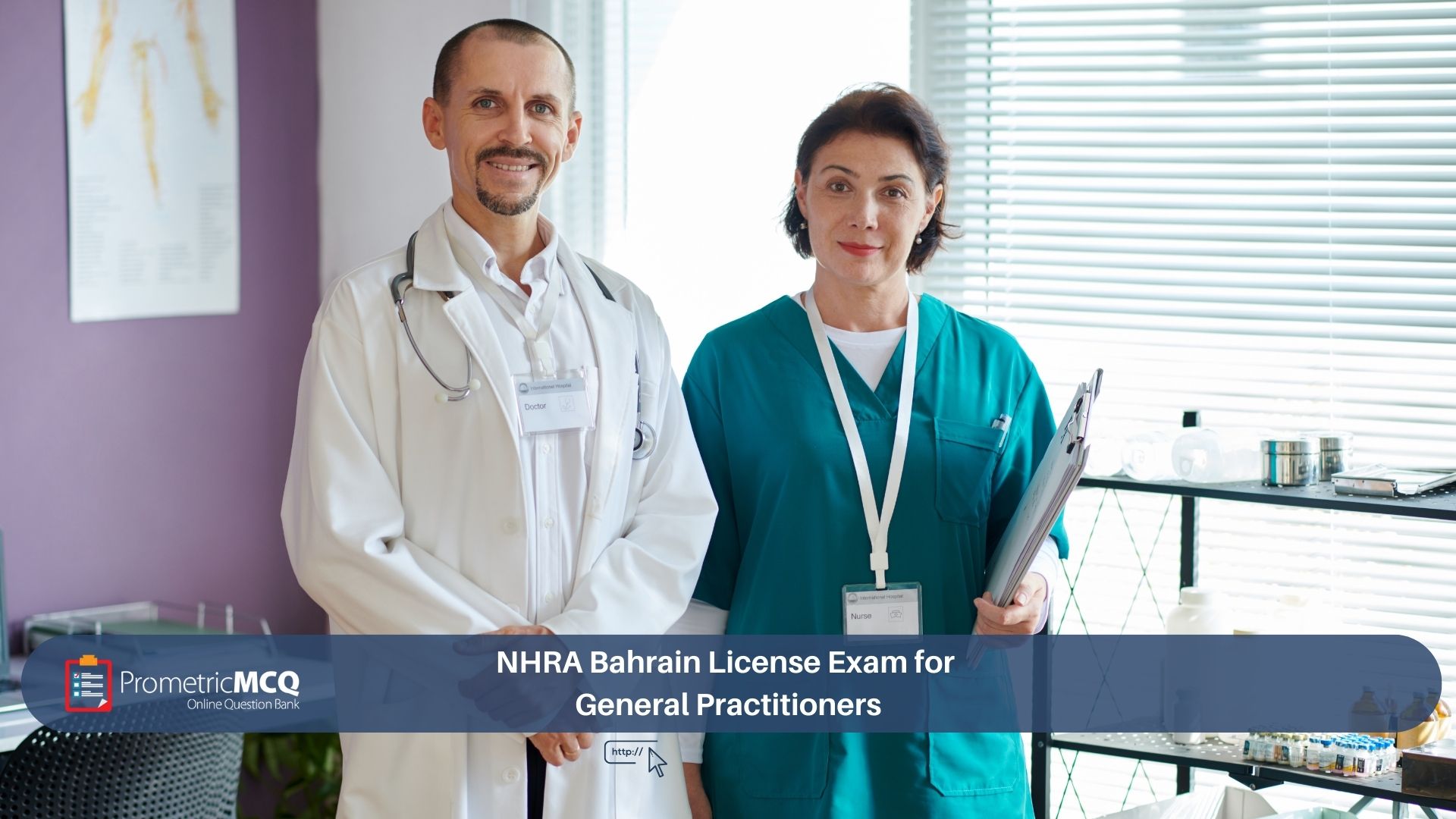
NHRA Bahrain License Exam for General Practitioners
fatima@prometricmcq.com2025-09-29T23:18:58+00:00Table of Contents
ToggleNHRA Bahrain License Exam for General Practitioners (2025)
The Kingdom of Bahrain has firmly established itself as a center for healthcare excellence in the Gulf, attracting skilled General Practitioners (GPs) from across the globe. To ensure that this high standard of care is maintained and advanced, the National Health Regulatory Authority (NHRA) has instituted a rigorous licensing process for all physicians. The cornerstone of this process is the NHRA Bahrain License Exam for General Practitioners—a comprehensive, high-stakes Prometric exam that serves as the benchmark for clinical competence and readiness to practice.
This is not a test of pure academic recall. The NHRA GP exam is a sophisticated assessment of your clinical reasoning, diagnostic skills, and ability to manage the wide spectrum of conditions seen in primary care. It is composed entirely of case-based Multiple-Choice Questions (MCQs) that are designed to simulate the day-to-day challenges of a busy clinic or emergency room. Success hinges on your ability to apply evidence-based knowledge to practical patient scenarios, making strategic, question-based preparation the key to passing.
This ultimate 2025 guide is your definitive blueprint for the NHRA GP exam. We will provide a meticulous breakdown of the exam pattern, a deep dive into the high-yield syllabus topics, and a series of realistic sample questions with detailed, evidence-based rationales. To ensure absolute clarity, this is all supported by a comprehensive 10-point FAQ section that addresses every aspect of the examination process. Our goal is to equip you with the knowledge and strategy to conquer this critical career milestone with confidence.
Key Takeaways for the NHRA GP Exam
- Clinical Reasoning is the Focus: The exam tests your ability to think and act like a competent GP—formulating differential diagnoses and management plans.
- Internal Medicine is the Core: The majority of questions will be drawn from Internal Medicine and its subspecialties. This must be the focus of your study.
- Guidelines are Gospel: Your answers must align with the latest international, evidence-based clinical guidelines (e.g., for hypertension, diabetes, asthma management).
- Master the “Next Best Step”: The most common question format asks you to choose the most appropriate next step in diagnosis or management.
- MCQ Practice is the Key to Success: The most effective preparation method is to solve thousands of high-quality, case-based MCQs.
Deconstructing the NHRA GP Exam: Pattern and Syllabus
A successful study campaign is built upon a clear understanding of the exam’s structure. Knowing the pattern is the first and most important step in your overall Bahrain NHRA exam preparation.
Core Exam Framework
- Administrator: Prometric
- Format: Computer-Based Test (CBT) with 100% MCQs.
- Structure: 150 MCQs.
- Duration: 3 hours (180 minutes).
- Scoring: A Pass/Fail result is provided. The unofficial passing score for GPs is estimated to be in the 60-65% range. There is no negative marking, so you must answer every question.
High-Yield NHRA GP Syllabus Breakdown
The NHRA exam for GPs is designed to be a comprehensive assessment of the knowledge required for primary care. A strategic study plan will focus on the most heavily weighted domains.
| Medical Domain | Approximate Weighting & High-Yield Topics for 2025 |
|---|---|
| Internal Medicine | ~50-60%: This is the most significant domain by far. You must master the outpatient and inpatient management of common conditions. Cardiology: HTN, Dyslipidemia, stable angina, ACS basics. Endocrinology: Type 2 Diabetes (oral agents, insulin initiation), DKA/HHS, Thyroid disorders. Pulmonology: Asthma (step-wise management), COPD, community-acquired pneumonia. Gastroenterology: GERD, PUD, IBS, viral hepatitis. Infectious Diseases: Common infections and appropriate antibiotic choices. |
| Pediatrics | ~15-20%: This section focuses on the common presentations in a general clinic. Topics include common infectious diseases (AOM, pharyngitis, bronchiolitis), normal developmental milestones, the national vaccination schedule, and management of pediatric emergencies like dehydration and febrile seizures. |
| Obstetrics & Gynecology | ~10-15%: You are expected to know the basics of routine antenatal care, screening in pregnancy, and recognition of major obstetric emergencies (e.g., pre-eclampsia, ectopic pregnancy). Common gynecological issues like abnormal uterine bleeding, PCOS, and common infections are also high-yield. |
| General Surgery & Emergency Medicine | ~10%: This domain tests your ability to recognize surgical emergencies. Focus on the presentation and initial management of the acute abdomen (appendicitis, cholecystitis, pancreatitis, diverticulitis) and the basics of trauma assessment (ABCDE approach). |
| Psychiatry, Dermatology & Other Specialties | ~5-10%: This covers the common conditions managed in primary care. Focus on the diagnosis and first-line management of depression and anxiety, recognition of common skin conditions (acne, eczema, psoriasis), and common ENT/Ophthalmology presentations (e.g., sinusitis, red eye). |
Free NHRA GP Exam: Sample Questions and In-Depth Answers
The best way to prepare is to practice with questions that reflect the exam’s style. Analyze each case, commit to an answer, and then meticulously study the rationale. This active learning process is the key to success. For a comprehensive experience, a dedicated QBank of General Practitioner MCQs is your most valuable asset.
Question 1: Internal Medicine (Endocrinology)
A 58-year-old man with a 10-year history of type 2 diabetes and hypertension comes for a routine check-up. His current medications include metformin, lisinopril, and atorvastatin. His blood pressure is 135/85 mmHg and his HbA1c is 7.8%. A recent urine test shows a urine albumin-to-creatinine ratio (UACR) of 150 mg/g. According to the latest international guidelines, what is the most appropriate next step in his management?
- Increase the dose of lisinopril.
- Add a diuretic such as hydrochlorothiazide.
- Add an SGLT-2 inhibitor such as empagliflozin.
- Refer the patient to a nephrologist immediately.
Correct Answer: C (Add an SGLT-2 inhibitor such as empagliflozin.)
Rationale: This question tests your knowledge of the most up-to-date guidelines for managing diabetic kidney disease. The patient has persistent albuminuria (UACR > 30 mg/g) despite being on an ACE inhibitor (lisinopril). Current guidelines from major diabetes and nephrology associations strongly recommend the addition of an SGLT-2 inhibitor (like empagliflozin or canagliflozin) in patients with type 2 diabetes and diabetic kidney disease. These agents have been shown to significantly slow the progression of nephropathy and reduce cardiovascular risk, independent of their glucose-lowering effects.
Why other options are incorrect:
A: While maximizing the ACE inhibitor dose is important, the addition of an SGLT-2 inhibitor is now the recommended next step for renal protection.
B: A diuretic would help with blood pressure control but does not offer the specific renal protective benefits of an SGLT-2 inhibitor.
D: While he will eventually need nephrology follow-up, immediate referral is not the “next best step” in management. The GP can and should initiate the SGLT-2 inhibitor.
Question 2: Pediatrics
A 15-month-old child is brought to the clinic with a 4-day history of high fever, cough, coryza, and conjunctivitis. Today, the mother noticed a red, maculopapular rash that started on his face and is now spreading down his body. She also mentions seeing small white spots inside his mouth yesterday. The child has not received all his vaccinations. What is the most likely diagnosis?
- Varicella (Chickenpox)
- Rubella (German Measles)
- Roseola Infantum
- Rubeola (Measles)
Correct Answer: D (Rubeola (Measles))
Rationale: This is a classic presentation of measles (rubeola). The key features are the prodrome of the “3 Cs” (Cough, Coryza, Conjunctivitis) and high fever. This is followed by the appearance of Koplik spots (the small white spots on the buccal mucosa), which are pathognomonic for measles. Finally, the characteristic cephalocaudal (head-to-toe) spread of the maculopapular rash confirms the diagnosis, especially in an under-immunized child.
Why other options are incorrect:
A: The varicella rash is vesicular (“dew drops on a rose petal”) and appears in different stages simultaneously.
B: The rubella rash is similar but is typically milder, and the prodrome is less severe, often without the classic 3 Cs or Koplik spots.
C: In roseola, the rash appears *after* the high fever breaks, not during the febrile period.
Frequently Asked Questions (FAQs) for the NHRA GP Exam
The exam is graded on a Pass/Fail basis, and the NHRA does not publish a specific passing percentage. However, the generally accepted unofficial passing score among candidates and experts is between 60% and 65%.
The core clinical content is very similar across all Gulf Cooperation Council (GCC) countries, as they are all based on international, evidence-based medicine. The format (150 questions in 3 hours) is also standard. Minor differences may exist in the exact distribution of topics, but a candidate well-prepared for one is well-prepared for the others.
For the GP clinical exam, the focus is almost entirely on international medical guidelines. You will not be tested on the administrative structure of the Bahraini health system or local public health statistics. Your study should be based on globally recognized resources like the World Health Organization (WHO), UpToDate, and major US/UK clinical guidelines.
You have an average of 1 minute and 12 seconds per question. Effective time management is key. It is wise to do a first pass, answering all the questions you know immediately. Flag the harder questions and return to them on a second pass. This ensures you bank all the easy points first.
Primary Source Verification (PSV) by the DataFlow Group is a mandatory verification of your medical degree, internship, experience, and license. It is a separate process from the exam but is required by the NHRA before they will issue your license. It is highly recommended to start your DataFlow application at the same time as you begin your exam preparation, as it can take several weeks or even months.
The consensus among successful candidates is that the most critical tool is a high-quality, comprehensive question bank (QBank) with case-based questions and detailed rationales. This active learning approach is superior to passively reading textbooks for mastering clinical reasoning.
No, the exam exclusively uses generic (international non-proprietary) names for all medications. You must be proficient with generic names (e.g., “lisinopril,” not “Zestril”).
The NHRA typically allows a candidate three attempts to pass the licensing exam. There is usually a waiting period between attempts. A failure should prompt a serious re-evaluation of your study strategy, with a greater focus on question-based practice and identifying your specific knowledge gaps.
As a GP, you are expected to be competent in both. The exam will include questions on managing chronic diseases in an outpatient setting as well as recognizing and providing the initial management for acute conditions that present to an emergency room or require admission.
Prometric offers a “Test Drive” service at many of its centers. For a small fee, you can book a 30-minute session that allows you to go through the check-in process and experience the testing environment and software. This can be a very effective way to reduce exam-day anxiety.
Conclusion: Your Gateway to a GP Career in Bahrain
The NHRA Bahrain License Exam for General Practitioners is a challenging but fair assessment of the skills needed to provide high-quality primary care. It rewards deep clinical knowledge, sound judgment, and a commitment to evidence-based practice. By adopting a structured study plan that focuses on high-yield domains and, most importantly, centers on intensive practice with realistic MCQs, you can build the competence and confidence required to succeed. Passing this exam is the definitive step toward launching a fulfilling and successful medical career in the Kingdom of Bahrain.
Ready to Master the Syllabus and Ace Your NHRA GP Exam?
Our premier General Practitioner question bank is filled with high-yield clinical vignettes, detailed, evidence-based rationales, and simulated exams designed to cover the entire NHRA syllabus and guarantee your success.

